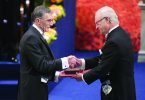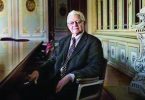The real name of Yaşar Kemal, who was born in 1923 in the village of Hemite in Osmaniye, is Kemal Sadık Gökçeli. His family emigrated from the village of Ernis located on the shores of Lake Van to Çukurova during World War I. The immigration theme that we come across in Yaşar Kemal’s works is an example of what the author himself inherited from his family and environment. The writer, who grew up in an environment well versed with bards and dengbej – Kurdish traditional singing – can be observed as he employs from these traditions in his novels and instills them quite masterfully into his literary performance. Yaşar Kemal who at a young age established close relations with the bardmen of Çukurova and even competed with them, was also a very sharp observer apart from what he heard from his environment. The writer, who lost one of his eyes at the age of five due to an accident when his father dropped a knife, was able to relay all the social problems and his observations ingeniously within his works.
The author, who constantly explores the stories of the children who were forced to mature so quickly with his well-known words of ‘the children in our village are also humans’, lost his father at a very young age. In this relation, Yaşar Kemal who himself was also ‘a child forced to mature way too quickly’, had taken the burden of life at such an early stage of his life. The writer who leaves middle school and works in various jobs like truck driving to being a petition-driver, establishes close relations after the 1940s with the prominent names of the literature and art world of Turkey like Pertev Naili Boratav, Abidin Dino, Kemal Tahir and Arif Dino.
The author whose first book ‘Elegies’ was published in 1943, moved to Istanbul in 1946 and established intimate relations with the most forthcoming individuals in the literary scene. The writer who returns back to Çukurova a few years later, experiences difficult times with the allegations of propagating for communism at such a young age and as a result, is sentenced to imprisonment at Kozan Prison. Following these events, Yaşar Kemal returns back to Istanbul in 1951 and begins to work for the newspaper Cumhuriyet. The writer, whose fame starts to spread with his first short story collection titled Yellow Heat in the 1950s, starts as well to create an impression with his interviews for the paper, Cumhuriyet.
Yaşar Kemal attains his fame as a master writer with the publication of his work ‘Memed, The Hawk’ in 1955. However, the more famous he becomes with his political writings, the more he has to deal with investigations and prosecution until the mid 1990s.
With his series of ‘Memed, The Hawk’ and ‘An Island Story’ in particular, Yaşar Kemal was not remembered only in Turkey and for Turkish Literature, but was also forthcoming amongst the universal novelists, as his works were translated into many languages. He was able to attain the universal level of aesthetics even of the smallest incidents taking place in Anatolia which could be observed by all, and illustrate them in the finest literary style. He was a river reaching the universal oceans through those local stories. Yaşar Kemal who is known as the novelist of Çukurova, soared beyond the geographies of his childhood with his narrative style on nature and man, and was able to transform ‘individual’ stories into ‘world’ stories. In this sense, he not only intertwined human stories with one another but was also able to create a world of knotted texts with a signature structure and through an intertextual approach.
Yasar Kemal, the master penman who was able to enrich our world of meaning and transform our aesthetic perceptions into colourful gardens, was able to deftly use motifs from his childhood memories or the family experiences with the rigor of a novelist. He narrated all of the sounds and stories he heard and all the mountains, seas, people, birds he observed with his single eye, in other words, all of nature, with literature and engraved the walls of our prisons with them. Apart from his success in his narrative style and story line, he will always hold a special place with his contributions to its Turkish language and for enriching the vocabulary and its world of meaning.









Leave a Comment